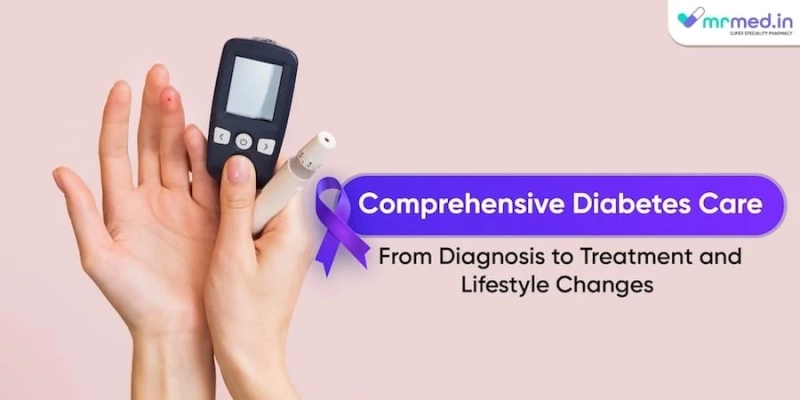Living with diabetes requires a daily commitment to managing your health effectively. It includes a combination of taking prescribed medications, making adjustments to your lifestyle, such as diet and exercise, and regularly monitoring your blood sugar levels. This comprehensive guide provides you with all the essential information you need to navigate this journey successfully. Whether you\'re newly diagnosed or looking to enhance your current management strategies, understanding the diagnosis process and learning about practical lifestyle changes can significantly improve your overall health and well-being.
What Is Diabetes?
Diabetes happens when your body doesn’t make enough insulin or cannot properly use the insulin it does make. Insulin is mainly responsible for managing blood glucose levels in your body.
What are the types?
- Type 1 Diabetes: It is an autoimmune condition in which the immune system of our body targets and damages the pancreatic cells that produce insulin.
- Type 2 Diabetes: This is the most common form of diabetes. In this type, the body either becomes resistant to insulin or doesn’t produce enough of it to keep optimum range of blood glucose levels in the blood.
- Gestational Diabetes: This type occurs during the pregnancy period and usually goes away after childbirth. However, pregnant women who experience gestational diabetes have an elevated danger of type 2 diabetes later in life.
What Is The Diagnosis Of Diabetes?
To find out if you have diabetes, your doctor will use a few different tests to check your blood sugar levels:
- Fasting Blood Sugar Test: This test measures blood sugar after you haven’t eaten overnight. A result of >125 mg/dL means you might have diabetes.
- A1C Test: This gives an average of your blood sugar levels over the past two to three months. An A1C of 6.5% or higher suggests diabetes.
- Oral Glucose Tolerance Test (OGTT): This test measures blood sugar pre- and post-drinking of a sugary liquid. A level of >200 mg/dL after two hours indicates diabetes.
How To Control Sugar Levels?
Managing diabetes effectively involves a mix of medication, lifestyle changes, and regular monitoring. Here’s how you can tackle each part:
- Medications: Various medications, including insulin and other antidiabetic medicines, help manage diabetes. For example, Ryzodeg 100IU Injection is a type of long-acting insulin that helps keep blood sugar levels steady throughout the day. It\'s crucial to follow your doctor\'s advice on the best medication for your needs.
- Diet and Nutrition: Eating a balanced meal is key to managing diabetes. Focus on a variety of whole foods like vegetables, fruits, lean proteins, and whole grains. Try to avoid your cravings for junk foods by not eating processed foods and sugary snacks. Monitoring how many carbohydrates you eat and spreading meals evenly throughout the day can help keep your blood sugar levels stable.
- Exercise: Regular physical activity aids your body to use insulin more effectively and reduces blood sugar levels. Walking, biking, swimming, or strength training are also beneficial.
- Blood sugar monitoring: Consistently measuring your blood sugar levels allows you to see how various foods, activities, and medications impact your health. This is vital for making informed decisions about your care.
Can Diabetes Cause Other Health Problems?
Yes, diabetes can lead to various health complications, such as:
- CVS Disease: Diabetes significantly increases the risk of heart disease, stroke, and high blood pressure.
- Nerve Damage (Neuropathy): Increased blood sugar levels can damage nerves, leading to pain, tingling, and loss of sensation, especially in the extremities.
- Kidney Damage (Nephropathy): Diabetes can harm the kidneys\' filtering system, potentially leading to kidney failure.
- Eye Damage (Retinopathy): Diabetes can harm the blood vessels in the retina, leading to blindness.
- Foot Problems: Poor blood circulation leads to nerve damage and can cause foot ulcers and infections, which might require amputation in severe cases.
How Do I Check My Diabetes Level?
To check your diabetes level, you can get a simple blood test done at a clinic or use a home glucose meter for quick results. Here are the steps to check your diabetes level:
- It is recommended to measure your blood glucose levels at home with the help of a blood glucose meter.
- Visit a doctor for a blood test that assesses fasting blood sugar levels.
- Get an A1C test to determine your blood sugar levels over the past few weeks/months.
- Consider an oral glucose tolerance test for a more detailed assessment in certain cases.
- Regular monitoring helps manage diabetes effectively and prevent complications.
Key Takeaways!
Living with diabetes means taking a comprehensive approach that includes medication, lifestyle changes, and ongoing monitoring. By staying informed and proactive, you can manage your diabetes effectively and lower the risk of complications. Each step you take towards better diabetes care is a step towards a healthier, more content life. Remember, with the right medications and significant lifestyle adjustments, you can manage your diabetes successfully. Always consult with your doctor for personalised advice and treatment plans tailored to your needs.



